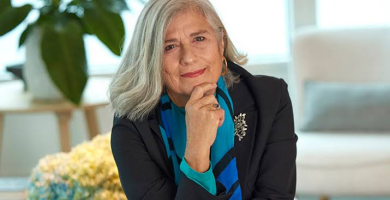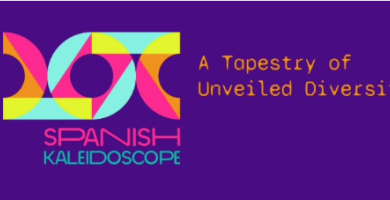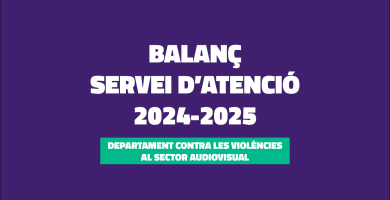
JUANJO GIMÉNEZ: "Normally, when you make a short, you ask for a lot from people and in exchange you give them very little".
This month we interview Juanjo Giménez, the film director and producer. A prize-winner at the Cannes festival and nominated for an Oscar for his short film Timecode. Among other things, we talk to him about the world of short films, about his experience as a director and producer, the success of Timecode and his future projects. In our current edition of Pantalla Barcelona you can also see one of his shorts, Nitbus.

How did you start out in the world of film?
Writing for friends who wanted to shoot and who encountered difficulties with the writing. Then I began to make shorts. As an adult, I studied at the C.E.C.C. (Centre for Cinematographic Studies of Catalonia), a centre which no longer exists. It was the school founded by Héctor Fáver and which used to be in Calle Caspe. I was there for two years. At the end you begin to make shorts and you take it from there. Then I set up the production company.
A lot of people abandon shorts when they make the leap to feature films, but not you. You are a great defender of this format. Why?
Yes, it sounds like a bit of a cliché when I talk about this. My career has been rather strange. I started out making shorts, then I made my first feature, Nos hacemos falta (Tilt), I set up the production company and I produced other directors, something that I still do. After my first feature film, I wanted to make a second, but things became very complicated and shorts helped me to keep my career as a director alive. Then there is another issue, which I always mention, which is that I am more at ease with short than with long stories and I find that they come out quicker. When I start writing, not just short films, but also short stories, I feel very comfortable with the short format.
There are many advantages on making shorts, although there are also disadvantages. But one of the advantages is that you can take more risks; you can try out things that you would not do with a feature-length film. There is less of a financial impact in all senses, and it allows more freedom, and I like this a lot.
Why do you think that there are people who consider shorts to be a minor discipline or less important than feature films?
I think that we are fighting a losing battle, don’t you? It would appear that the senior format, with which everyone understands that you are a professional in the discipline, is the feature film. This comes from many years ago, and there is a lot that we could say about it. There are filmmakers who use the short film as a means of expression and who have hardly made any feature films and who are geniuses. It is, however, true that the general consensus is that to make serious films they have to be feature films. You can refute this a little with five minutes of conversation.
Then you have to look at how the short has evolved. When you talk about short films with people who are not familiar with the film industry or who do not know about the subject of production, they understand that it is something that you do almost without a budget, enrolling your friends and then uploading it to YouTube. And that is all very well, but it can also be other things. There are preconceptions, misunderstandings. I am not too bothered by all of this. I consider what I want to do or explain and don’t think much about that. Especially at this stage, I believe that I have gone beyond that.
Apart from writing for film, you also write short stories. Do you have a different approach when it is your project to when it is a project for other people?
When writing, I write for myself. In the beginning, when I wrote, and I didn’t even have any idea whether I was going to go into making films, I did write for others, but we’re talking about prehistoric times. Since then, I have written for myself. When I write a script I think that I will direct it myself. I do not now think just as a scriptwriter. Maybe if I received the right project I wouldn’t have any problem, but in principle what I write is to make a film with me behind it.
Talking about prehistoric times, it was some years ago now, how did you go from “making shorts with friends” to “this is what I want to do”?
I remember writing something that I liked a lot at that time, which must have been terrible (laughs). We shot it in El Prat with a friend who was a director. He made it and he finished it in a bad way. I saw it and I said “damn it, that is not what I wanted”. Then I said to myself “the next one that I write, I’ll do it myself”. And that’s what I’ve done until now. Maybe it’s a mistake to write, to be on top of it all and to help, since you see that it deviates from what you had imagined.
You also created your own production company, Nadir Films. How and why did you create it?
We set it up with friends from the C.E.C.C. There were four of us and in the end we were almost a dozen. There were people who still make films, like Adán Aliaga. Since then I have made many films with him. There was Pablo García, who has made Fuente Álamo and Bolboreta, mariposa, papallona. I have also worked with Luis Miñarro. Three or four of us continued. The rest left it. It was like a sort of cooperative. Then, as the people started leaving, I took over the running of the production company, I became the administrator and main partner, and that is still the situation today. But it began almost like a school project.
Your short Timecode won in Cannes and was nominated for the Oscars. What was that experience like now that you see it from a distance?
You never think that something like that can happen with a short. People ask me: “At what moment did you see or think that it would make it?” And, to be quite sincere, I have made quite a few shorts and, when you make them, you do so with the greatest effort and putting everything that you have into it. With Timecode it was the same; what happened is that this one worked in spectacular fashion and won the Palme d’Or, etc.
We made the most of the experience because I am aware that it is very difficult for it to happen or to happen again. It was a sensational experience, not just for me but for everyone who helped. Because normally, when you make a short, you ask for a lot from people and in exchange you give them very little. Although I try to maintain a small production with full guarantees, people who are paid a minimum and who have the best working conditions possible. But even so, we know that shorts are always short of everything. And I think that what happened with Timecode is a reward for everyone. I also take it as a reward for the people who have helped me a lot, not just with this short. I normally work with the same people.
How do you think that this nomination benefited you and how did it harm you, if at all?
I don’t think it harmed me. You always have a little more pressure: if the last thing that you did worked so well, the next one has to as well. But I don’t see any problem in this. It was all advantages. The short opened many doors for us. It should be or it is easier to launch the next project, which is becoming complicated for other reasons, but I am very grateful to the short. It helped us a lot.
What difficulties do you encounter when it comes to starting a new project?
It’s all difficulties. Like for everyone, I suppose. There is the relationship between project ambition/results and the requirement for financing or the effort that needs to be made. I have also been on both sides, as producer and director. I know what it means to launch a sound project, when you need the typical financing of the country in which we are: to find private subsidies and public subsidies. It takes a long time and is a problem to organize the whole funding part, which is normally a very long process, even if it goes very well. Above all, when you’re talking about directors who take some creative risks. Sometimes it becomes a small nightmare to create a film with a minimum of ambition. But those of us who are devoted to this already know about all these problems. I would therefore go back to what I was telling you before. Sometimes what the short does is to help you to take the right path. It saves you from the complicated process of financing a feature film which can take a long time and can demoralize the whole team a little. I find that it is very quick with the short. You think about it and you do it. Although it’s not always like that. But you have the point that you can say that you don’t want to have to confront so many obstacles and so much paraphernalia which is normally involved in financing a feature-length film here.
Timecode participated in the first edition of Pantalla Barcelona. How do you think that this type of initiatives helps short films?
A lot. I now believe that the network helps people to access shorts a great deal, although I am a defender of the big screen when it is possible. Timecode or other shorts of mine are conceived to be seen on the big screen. For many years now there have not been shorts before the feature films in cinemas. With Pantalla Barcelona, there is an opportunity to see a short film in good conditions and with an audience which is not normally the captive audience that shorts have. They are not people who go to the festivals of short films for example. And they are given the opportunity to enjoy a short film on the big screen and with good projection conditions. I think that all this is a luxury. It shouldn’t be a luxury, but it is, because there are few opportunities to have a short film showing on the big screen.
Do you believe that all of the new platforms, which are not on the big screen, and which also offer shorts, are of use to shorts or give them visibility?
It’s difficult. Filmin makes a big effort. Jaume Ripoll helps us and has always taken care of shorts. They have a policy of shorts. Sometimes they leave them for free. Timecode had a small fee when it was premiered. And they do have this vision of looking at a director’s career with their shorts. I would say that the short film is not within the priorities of Netflix, although it is true that I do not know it. And I believe that it would be difficult with other platforms. But I’m not an expert on this matter. There are, however, ways of accessing shorts. Vimeo has “staff picks” or things like that with shorts. Highlighting them so that people will access them. Except for Filmin, which I believe is the exception, the short is somewhat forgotten on these platforms.
What projects interest you as a producer?
Normally there has to be a very strong connection with the director or I have to know their work or career. Then I am a producer who becomes involved. I like to be involved in the project, in everything. I don’t know whether that’s good or bad, but that’s what I’m like. Lately I have been more focused on launching my projects as a director, also thanks to Timecode and to having the opportunity to shoot a feature film. Despite the fact that I shot a short before. If they are not mine, they are normally special projects or projects in which I believe. I suppose that I am not special; I believe that there are many producers who work along the same lines as me.
You also give classes at Reus film school.
Not this year. But I have given classes in Reus and I have run workshops at FX Animation in Pueblo Nuevo and at Plató de Cinema which is in Hospitalet.
Are the new generations of directors interested in shorts?
Yes. I have discovered that, when I talk with students or people who are beginning, and they realize that the normal and more common sense way of starting is to make a short, they do not watch them or they watch very few. This is a bit of a contradiction. You want to start out by making your short, but you do not have this culture of knowing the format and seeing big films which can be made in this format. I do not blame them though; it’s the system which is like that. Feature films are predominant. But, on the other hand, they normally have to start out with a short. There are exceptions. Orson Welles began with Citizen Kane.
The history of shorts is not explained in the history of film.
I try to teach it in my classes. Indeed, the first films were shorts: the Lumière brothers and Georges Méliès made shorts. And people have access to fantastic shorts with a single click. But this culture doesn’t exist. That’s what the situation is like.
What do you think can be done to create this culture?
If good shorts are made, people will want to access them. And people who approach them and search a little… The problem is that there is so much that it is difficult to distinguish. This is where festivals do such good work. Here, we have a few. From the classical Filmets, Mecal, L’Alternativa has a part with shorts, ... There are five or six festivals in Barcelona. The festivals help you, because you say: “I want to see a short, where do I begin?”. And you have the festivals and platforms like Filmin. I don’t know how to change it. I don’t have a magic wand, but the situation is not catastrophic.
What are you working on at the moment? If you can tell us.
We are finishing a short, which is almost ready. We are in the post-production and sound editing stage. I am preparing a feature film. We wanted to shoot this year but it has been delayed due to funding issues. But I think that we are on the right path and that we will shoot at the beginning of the year.
And when will the short be released?
In September or October. It’s a comedy. It doesn’t have much in common with Timecode. If people ask me I would tell them that it is not Timecode 2, not by a long chalk. I think that the time had come to do something different. If you go to festivals and see sessions of shorts, there are not that many comedies. I remember when they showed Timecode at Cannes; there were 10 short films and, despite the fact that Timecode is not a comedy, it does have a touch of humour. Our short was the one which was closest to this genre. The rest were all dramas, even tragedies. I did it a little consciously because I wanted to make a comedy. And this is intended to be a very serious comedy. As the English say, “Serious fun”. You will see you it soon.









